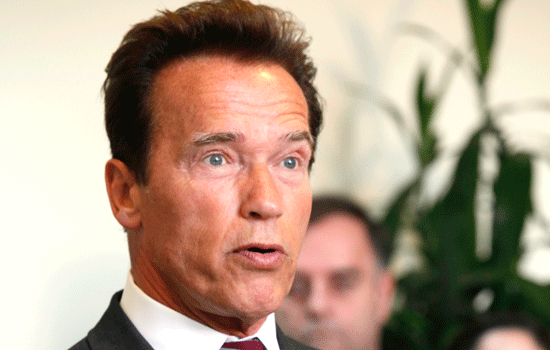
In this June 9, 2010 file photo, California Gov Arnold Schwarzenegger speaks at news conference. (AP)
Some California state workers are preparing to tap into their savings while others already are cutting expenses as Gov. Arnold Schwarzenegger's minimum wage order moved one step closer to reality.
On Friday, the Schwarzenegger administration won an appellate court ruling saying it has the authority to impose the federal minimum wage of $7.25 an hour on more than 200,000 state workers as California wrestles with its latest budget crisis. It was not immediately clear if the state controller, who cuts state paychecks on a decades-old payroll system, will comply. The office says its computers are unable to make the change until an upgrade is completed in two years.
The effect, however, was chilling for state government workers, many of whom say they have to prepare as if the pay cut will happen.
"I feel like we have a target on our backs," said Robert Blanche, a 20-year state worker in the disability division of the Employment Development Department. "My wife stays at home with the kids. This is our sole source of income. And people are going to lose their homes, lose their cars."
The loss of wages -- even temporarily -- for such a large work force would deal an especially harsh blow to the capital region, where one out of 10 workers is a state government employee. According to the state Employment Development Department, there were 84,600 state workers out of 819,100 people employed in the Sacramento region in May. The number is higher when counting colleges and universities.
A cut to a minimum wage would mean state workers would make the equivalent of $15,000 a year. The average state worker makes $65,000 annually, according to the state Department of Personnel Administration.
"We all understand the immense budget pressure facing governments right now," Sacramento Mayor Kevin Johnson said in a statement. "However, paying state workers minimum wage will have a devastating effect on Sacramento's economy and on thousands of families."
Jeff Michael, director of the Business Forecasting Center at the University of the Pacific in Stockton, said it's hard to judge how workers and their families will react to this latest possible financial hardship. He said some may pull back spending while others may charge bills to their credit cards and "hope the money will come back before the bill is due."
State workers already have endured 46 days of furloughs that cut their pay by 14 percent. The furloughs ended in June, with Schwarzenegger trying to persuade unions to take a 5 percent pay cut through contract negotiations.
Sacramento-based Golden 1 Credit Union, which serves more than 56,000 state workers, has announced it will provide a loan to members who receive minimum wage or do not get paid as a result of the budget impasse. State doctors and workers will not get paid until a budget is signed because by law they cannot be paid minimum wage.
Some of the loans will be interest-free.
In what has become an annual spectacle, California began its new fiscal year Thursday without a balanced budget. The budget gridlock usually affects only a few thousand workers, many whom work for lawmakers, while companies that contract with the state have to plan for payment delays.
This year, after several previous rounds of budget cuts, Schwarzenegger and Democratic state lawmakers remain far apart on ways to close the state's $19 billion deficit. Several workers taking their lunch breaks near the Capitol on Friday indicated they already have begun cutting back because Schwarzenegger has been threatening the minimum-wage move for months.
Niki Ortiz Levy, 33, an office technician at the transportation department, said she is hoping Schwarzenegger and lawmakers can reach a compromise on the budget before paychecks are cut at the end of the month. She makes $29,000 a year.
"We're not going to spend any money on anything we don't need," said the mother of a 3-year-old. "We're not eating out, we're going to cancel our DirecTV. We can't not plan for it." Ortiz Levy said she and her husband, who works for Hewlett-Packard Co., expect to tap into savings to pay for day care and other expenses if the minimum wage goes into effect.
Michelle Carlson, a 42-year-old married mother of two, said her family can weather the minimum wage for a short time.
"We can absorb it for a few months, but I've heard a lot of people say they cannot," said Carlson, a recycling specialist at the Department of Resources, Recycling and Recovery. "For some people, it could be pretty tough."
Schwarzenegger's minimum wage order will not affect all of California's government employees. The 37,000 state workers represented by unions that recently negotiated new contracts with the administration will continue to receive their full pay because they agreed to pay cuts and pension reforms.
Salaried managers who are not paid on an hourly basis would see their pay cut to $455 a week.
The minimum wage fight stems from a budget impasse two years ago. Schwarzenegger issued the order, but it never took effect because state Controller John Chiang refused to go along with it. That prompted the legal fight that led to Friday's ruling from the California 3rd District Court of Appeal in Sacramento.
It concluded that Chiang cannot ignore the governor's minimum wage order. In a statement after the appellate court ruling, Chiang said he interpreted the decision to mean that his office would not have to comply with Schwarzenegger's executive order if the office had "system limitations."
Blanche, who works at EDD, said he and other workers say they feel like they're being used by Schwarzenegger as political pawns as he tries to negotiate for pension and budget reforms with the Democrats who hold majorities in the Senate and Assembly.
"This is the worst response to a budget crisis I've seen," Blanche said. "He's trying to balance the budget on the backs of state employees."












































